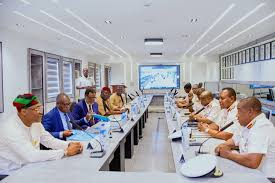Maritime
Customs Rakes In N4.49trn In One Year

The Nigeria Customs Service (NCS) says it generated N4.49trillion in one year.
Comptroller-General, NCS, Adewale Adeniyi, disclosed this to newsmen recently while presenting his scorecard of one year in office.
He said NCS’s revenue increased by 74 per cent to N4.49trillion between June 2023 and May 2024, when compared to what the service collected during the same period in the previous year.
“Exactly one year ago, today, and approximately three weeks into the inauguration of President Bola Tinubu, I was appointed by Mr President as the Comptroller-General of this strategic agency, the NCS”, he recalled.
Outlining some of the key milestones recorded by the service under its core statutory responsibilities, Adeniyi said, “The NCS reported a remarkable 74 percent growth in revenue collection over the past year, recording a total revenue collection of N 4.49trillion between June 2023 and May 2024, compared to the N2.58trillion collected during the corresponding period of the previous year”.
This feat, according to him, was “underpinned by a sustained increase of 70.13 per cent in average monthly revenue collection compared to the previous year. NCS recorded an average monthly revenue collection of N343billion, compared to the N202billion monthly average.
“Notably, there was a substantial 122.35 per cent rise in revenue collection during the first quarter of 2024 compared to the same period in the previous year. These gains were attributed to various strategic initiatives”.
Adeniyi said the initiatives include the N15billion recovery by the Revenue Review Performance Recovery Exercise; N2.79billion recovered from the 90-day window for the regularisation of the documents of uncustomed vehicles and the N1.5billion recovered from the decongestion of 1,705 overtime containers and 981 vehicles from the port.
“Initially handling 317 Single Goods Declarations in transactions, the terminal now manages 7,464 SGDs, accounting for 19.49 per cent of the total 38,294 export transactions recorded in 2023.
“By the first quarter of 2024, the service has processed a total of 10,786 transactions, with 3,162 (29.32 per cent) of these processed through the dedicated export terminal”, Adeniyi stated.
Speaking on the protection of society, he said the agency’s anti-smuggling efforts in the past year were intensified, resulting in significant interceptions, high-value seizures, and numerous arrests.
“Notably, the service recorded 63 seizures related to animal and wildlife products valued at ¦ 566m. Additionally, seven seizures of arms and ammunition were made through our ports and borders.
“In terms of illicit drugs, a combined total of 127 cases involving narcotics and pharmaceutical products were seized, valued at over ¦ 6bn.
The service also recorded 724 seizures of 2.93 million litres of Premium Motor Spirit (petrol) that were attempted to be smuggled out of the country.
The illegal dealings in petroleum evacuation have garnered the interest of relevant stakeholders, and the ongoing Operation Whirlwind will continue to intercept and disrupt the activities of smugglers in this regard.
“In a bid to guarantee food security and suppress the smuggling of food in and out of the country, the service recorded 1,744 cases of rice and grain seizures valued at ¦ 4.4bn. These concerted efforts underscore the NCS’s commitment to protecting society and ensuring national security”, Adeniyi stated.
On exchange rate issues, he said, “With the support of the Minister of Finance, NCS is working in close collaboration with the Central Bank of Nigeria CBN to achieve a stable rate for import of goods to enable businesses to plan their activities.
“On compliance with Customs laws, the Service is constantly reviewing its processes in line with the Nigeria Customs Service Act 2024 to ensure that leakages are blocked and offenders of Customs laws are made to face the full penalty and the wrath of the law.
“On Customs modernisation, the NCS is engaging relevant stakeholders to ensure that the deliverable of the customs modernisations are met as the service continues to phase out manual processes with automation”.
As regards trade agreements, Adeniyi said the Service is working closely with relevant stakeholders to ensure that the implementation of trade agreements like the African Continental Free Trade Area yields the desired benefits to Nigerians.
“Moreover, the Service has signed a Memorandum of Understanding with strategic trade partners like China Customs and recently is working with the Benin Customs to facilitate the creation of a new joint border post along the Segbana-Tsamia border with the Republic of Benin at Kebbi”, he stated.
On National security, he said the Nigeria Customs Service would continue to work with relevant national and international agencies to share intelligence and develop structured frameworks to ensure that those seeking to disrupt the peace and stability of the nation do not go unpunished.
He also said the service would continue to work tirelessly to ensure that the business of food hoarders is unprofitable to tackle food inflation.
Maritime
NCC Announces Telecoms Facilities Protection Measures

Maritime
Bureaucracy, Relationship Gaps, Bane Of Maritime Safety Investigation – NSIB

Maritime
UNDP, REA Partner On Clean Energy Transition

-
Featured3 days ago
Rivers LG Poll: APC Wins 20 chairmanship seats, PDP Clears Three
-
News3 days ago
Stop politicising Niger Delta’s plight over personal interest, Ex-militant warns Ijaw youths
-

 Nation3 days ago
Nation3 days agoAccolades, Fanfare As Ogbakor Ikwerre President General Celebrates 80th Birthday
-
News3 days ago
Cleric Condemns Increasing Theft in God’s House
-
News3 days ago
Keep faith with Tinubu’s Renewed Hope Agenda – NOA begs Nigerians
-

 Niger Delta4 days ago
Niger Delta4 days agoBayelsa Tasks Security Agencies On Vigilance Over Waring Communities
-
News3 days ago
Okpebholo, Edo Speaker mourns ex-IGP, Arase
-
News3 days ago
Ojulari: CNPP, civil society groups demand judicial probe into NNPCL

